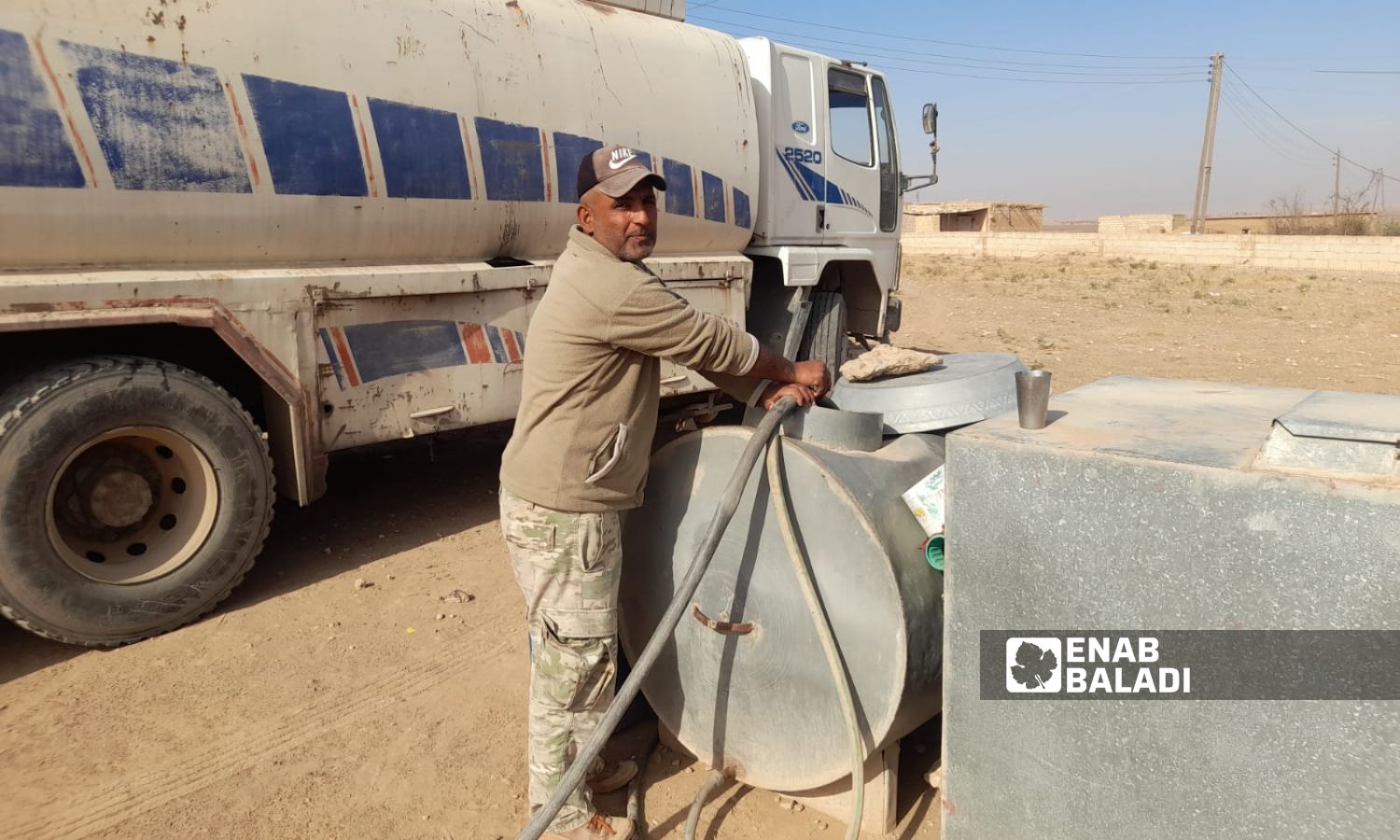



Enab Baladi – Ras al-Ain
Residents of the Ras al-Ain countryside in northwest al-Hasakah have been suffering from a gradual increase in water prices since last June. The price of a water tank with a capacity of five barrels has risen from 60,000 to 100,000 Syrian pounds ($7 USD) this August.
This increase has affected the residents’ lives, making access to “affordable” water a real challenge for them at a time when day laborers earn between 80,000 and 100,000 Syrian pounds (one dollar equals 15,200 Syrian pounds).
As summer arrives, water consumption increases among the residents, and the majority are forced to refill their drinking water tanks every three days.
Farid al-Hassan, a resident of the village of al-Manajir south of Ras al-Ain, said that the price of a water tank with a five-barrel capacity used to not exceed 50,000 Syrian pounds but has recently risen significantly, adding an extra financial burden on him.
He explained that his family consumes more water in the summer, forcing him to pay more than 200,000 pounds weekly just for drinking water.
He added that he relies on the well next to his home to meet the household’s needs, but it is not suitable for drinking, considering that traders exploit residents’ need for water by imposing high prices on them.
He mentioned that village residents received promises from responsible officials to address this issue, including providing drinking water either by bringing water from the Alouk station or drilling deeper wells instead of surface ones.
From his side, Aziz al-Azzo, a resident of the village of Tal al-Muhammad east of Ras al-Ain next to areas controlled by the Syrian Democratic Forces (SDF), said that village residents face the same problem and rely on themselves to get water by using motorcycles and private cars to bring it.
He told Enab Baladi that he is forced to travel by his car to Ras al-Ain to fill water from the source because water tankers do not reach his village due to fears of them being targeted by the SDF.
In the village of Freiseh to the southeast of Ras al-Ain, there is a well operating on electricity, which was maintained and operated by the local council and provides water for the village, but it is not suitable for drinking, forcing residents to buy water.
The well was drilled during the Syrian regime’s control of the area before 2011, and it has not been replaced or a new well drilled up to now due to the high cost of drilling a new well at a depth of 450 meters, which the village residents cannot financially bear.
Despite the local council implementing many projects and installing solar energy systems in the city and villages, there is still a shortage of water, as some villages need new wells drilled and solar energy systems installed to ensure sustainable water provision.
The local council spokesman, Ziyad Moussa Maliki, said that the council implemented 20 solar energy projects and drilled several wells to provide water in collaboration with the Syrian Interim Government (SIG) and organizations.
Maliki told Enab Baladi that the council has a comprehensive plan to solve the water problem, noting that the countryside’s water needs have significantly decreased compared to 2023, thanks to the implementation of solar energy projects in the region.
He added that the increase in water transportation costs by tanker owners is due to the rise in fuel prices and the decline in their work recently, as more than 50% of the countryside’s needs have been covered.
He pointed out that water is a right for all residents, and the local council will work to find effective solutions for all villages, including partnerships with some organizations to drill new drinking water wells.
Sixty percent of the countryside residents rely on drinking water from the Alouk wells, which contain 30 wells and a main pipeline with a diameter of 1200 millimeters. The SDF is accused of cutting off electricity to these wells, causing them to stop and leading to a severe water supply crisis in the countryside of Ras al-Ain and al-Hasakah province.
if you think the article contain wrong information or you have additional details Send Correction